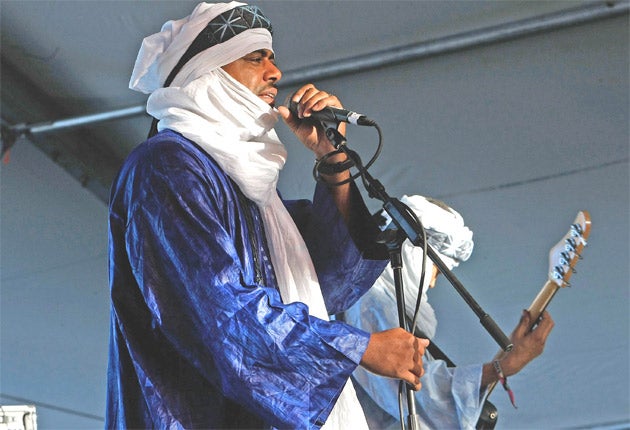Late on in Tinariwen's set, during the song "Imidiwan Winakalin" ("Friends Of My Country"), the bassist Eyadou Ag Leche leaves his post at the right rear of the stage and joins the singers and dancers Hassan Ag Touhami and Wonou Walet Sidati at the opposite corner, joining in with their distinctive swaying, shuffle-skipping dance at the front of the stage; by the time the set ends shortly after with the ever-popular Amassakoul'n'Tenere" ("Traveller In The Desert"), he's performing the most outlandish high-stepping counterpart to his bassline, like a trotting racehorse striving for the finishing line.
It has taken around an hour and a half to reach this point, during which the group's performance has first smouldered, then ignited, before becoming a raging blaze. Back in their desert homeland, I've seen their fellow Touareg dancing to Tinariwen, and it's the subtlest, least flamboyant expression of the terpsichorean muse imaginable, just a gentle swaying motion, with the feet shuffling no more than a few inches from side to side; so Eyadou's animation is quite unusual, evidence perhaps of the way the music takes him over as the show goes on. For if the frontman and chief songwriter Ibrahim Ag Alhabib is the band's soul, then Eyadou is its heart, his rolling dub/funk basslines pulsing away at its core, providing the bodily propulsion that enables the spidery guitar lines and mesmeric call-and-response vocals to access the mind.
Tinariwen has one basic rhythm which applies, with minor adjustments, to all their material. But what a rhythm it is – an infectious, twitchy beat surely derived from centuries spent travelling on camels, settling into their endless, loping gait in a way which keeps circulating around the body even when dismounted.
In their music, on tracks like the itchy "Chatma" ("My Sisters") and the crowd-pleasing "Cler Achel" ("I Spent The Day"), the beat is passed across from Said Ag Ayad's darbuka hand-drum (now joined by a second percussionist tapping imperceptibly on a gourd) to the syncopated handclaps of the dancers, with Eyadou's bassline suspended elastically between them.
In places, the groove speeds up as the music builds to a feverish climax, the elastic contracting smoothly, a fluid momentum beyond the mere mechanics employed in most western pop these days.
Subscribe to Independent Premium to bookmark this article
Want to bookmark your favourite articles and stories to read or reference later? Start your Independent Premium subscription today.


Join our commenting forum
Join thought-provoking conversations, follow other Independent readers and see their replies